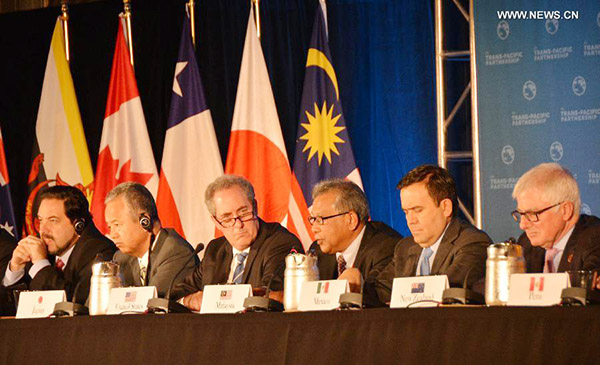US-led trade pact is not an impossible challenge
By Xu Man (chinadaily.com.cn) Updated: 2015-11-17 11:13
|
 |
|
Trade ministers of the United States and 11 other Pacific Rim countries attend a press conference after negotiating the Trans-Pacific Partnership (TPP) trade agreement in Atlanta, the United States, on Oct. 5, 2015. [Photo/Xinhua] |
Twelve countries have signed the Trans-Pacific Partnership Agreement. But it is still early to gauge the impact of the TPP on China’s economy, because the huge development differences among TPP members mean it will take them a long time to fully implement the agreement.
High standards and new rules for government enterprises, environmental protection, labor and intellectual property, however, suggest the TPP, once its becomes fully operational, will not only pressure China to seek trade diversion but also significantly influence the trading system in the Asia-Pacific region and beyond.
Given these facts, China should step up its efforts for regional economic integration. Since member states of the Association of Southeast Asian Nations are strategically located on the 21st Century Maritime Silk Road, China has to strengthen communications and exchanges with these countries — especially Singapore, Malaysia, Brunei and Vietnam which have signed the TPP Agreement — to forge a closer “community of destiny” in the region.
By inking TPP, together with its efforts to negotiate the Trans-Atlantic Trade and Investment Partnership, the United States seems to be building a new trade and investment regime across the Pacific and Atlantic without including China. US President Barack Obama has gone all out to make the TPP a major achievement of his term in office and a core part of his “return to Asia-Pacific” strategy. And although the White House has repeatedly claimed the TPP is aimed at containing China, words like “China” and “geopolitics” were frequently used to lobby Congress for “fast-tracking” the deal.
Also, in a recent report on the US’ China policy, the Council on Foreign Relations termed the TPP a great strategy to counter China’s rise. And in a statement issued on the day the TPP Agreement was reached, Obama said the US should not let countries like China write the rules of the world economy.

I’ve lived in China for quite a considerable time including my graduate school years, travelled and worked in a few cities and still choose my destination taking into consideration the density of smog or PM2.5 particulate matter in the region.











